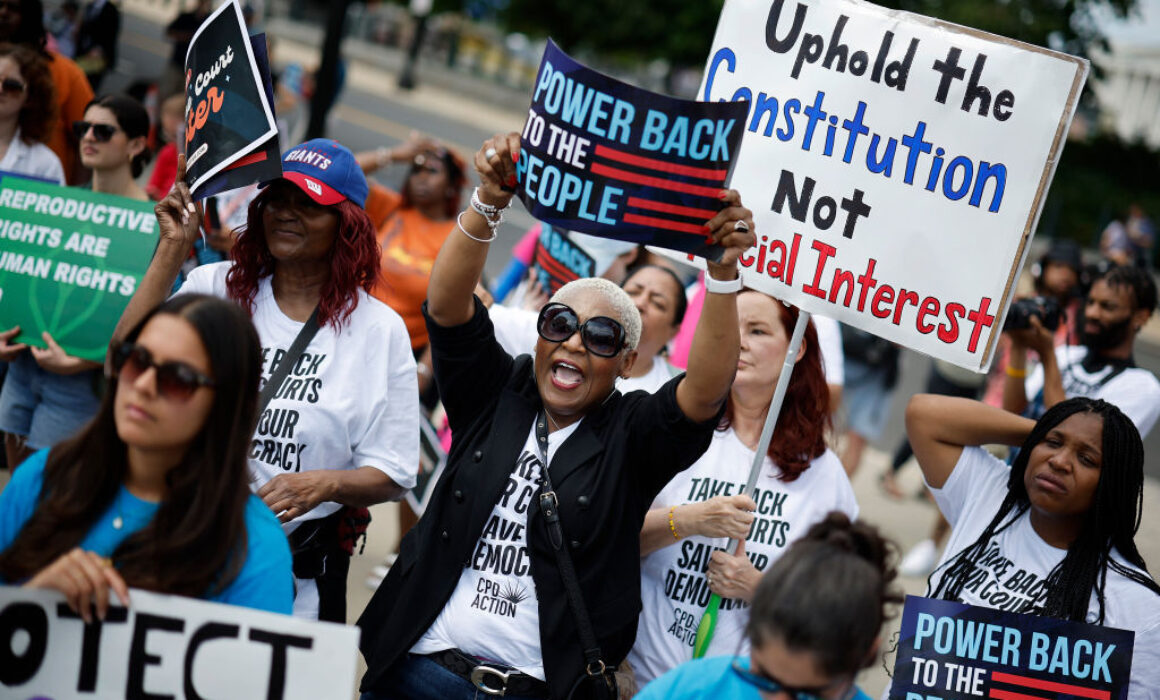We Need SCOTUS Reform Now More than Ever
August 2, 2024
The court’s latest power grab, and how it will hurt democracy.
The Roosevelt Rundown features our top stories of the week.

Demonstrators protest in front of the Supreme Court in June 2024. (Photo by Chip Somodevilla/Getty Images)
Today’s Supreme Court Is a Threat to Democracy
This week, President Biden proposed a series of Supreme Court reforms to establish term limits for justices, impose a binding ethics code, and propose a constitutional amendment overturning the court’s recent presidential immunity decision. These efforts signal an important first step toward reining in the rogue institution—a task that’s grown increasingly urgent in the wake of radical, right-wing rulings gutting the government’s power to govern. In a new blog post, Roosevelt’s Suzanne Kahn warns of the impact of one of this term’s most significant decisions—overturning Chevron deference.
By reversing the Chevron v. Natural Resources Defense Council precedent that courts should defer to agency experts when interpreting ambiguous, often highly technical laws, the Loper Bright v. Raimondo decision “has thrown the work of every federal regulator into doubt” and “gives courts the ability to insert themselves into the legislative implementation process with new freedom,” writes Kahn.
The decision is a result of a yearslong alliance between corporations and the courts that pushed for a conservative deregulatory agenda. The Loper decision could make it harder for the state to regulate the health insurance industry, respond to evolving predatory industries like cryptocurrency, set wage and labor standards, and enforce the Clean Air and Water Acts.
“A democratic government that can’t reliably ensure and deliver basic necessities—like clean water, safe financial systems, and reasonable access to health care—is not secure,” writes Kahn. “To rebuild confidence in our government and convince people that we have a worthy system, we need to make Congress and the agencies more effective, not less.”
Read more in “How SCOTUS’s Chevron Strike-Down Will Hurt Americans—and Democracy.”
Bold Ideas, Emerging Leaders
This week, the Roosevelt Network published the 2024 edition of its Emerging Fellows journal —a collection of policy briefs exploring progressive solutions to state and local issues, written and researched by the Network’s latest cohort of undergraduate Emerging Fellows.
“If we believe that change might be our one constant, then it should be clear that our fight must be for the kind of change we want and need,” write the Network’s Katie Kirchner and Eric Paul in the foreword. “There are many ways to do that; the Roosevelt Network Emerging Fellows do so by developing around-the-corner policy ideas that could fundamentally change their communities.”
The change-making policy ideas discussed in these briefs include securing better wages and labor conditions for food service and tipped workers, ensuring environmental justice in infrastructure and renewable energy projects, stifling the corporate power of utility companies and Big Tech, and alleviating the housing crisis through policy and increased community engagement.
What We’re Talking About
🆕 Progressive economic policy has some unfinished business, and we should not wait for another large financial failure to do it.@steelewheelz details the urgency and provides a framework for regulating the banking system in our latest brief 📄 https://t.co/cNQMUIsCJ8 pic.twitter.com/QWuqcLu5oc
— Roosevelt Institute (@rooseveltinst) August 1, 2024
What We’re Reading
Ex-Biden Treasury Official Details Playbook for Next Administration – feat. Roosevelt Fellow Graham Steele – American Banker
Funds to Help Low-Income Families with Summer Electric Bills Are Stretched Thin – feat. Roosevelt Fellow Diana Hernandez – Texas Observer
Powell Says Fed Could Cut Rates ‘As Soon As’ September Meeting – Bloomberg